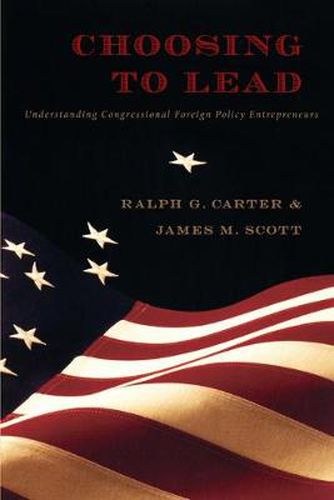Readings Newsletter
Become a Readings Member to make your shopping experience even easier.
Sign in or sign up for free!
You’re not far away from qualifying for FREE standard shipping within Australia
You’ve qualified for FREE standard shipping within Australia
The cart is loading…






This title is printed to order. This book may have been self-published. If so, we cannot guarantee the quality of the content. In the main most books will have gone through the editing process however some may not. We therefore suggest that you be aware of this before ordering this book. If in doubt check either the author or publisher’s details as we are unable to accept any returns unless they are faulty. Please contact us if you have any questions.
Shedding new light on how U.S. foreign policy is made, Ralph G. Carter and James M. Scott focus on congressional foreign policy entrepreneurs, the often unrecognized representatives and senators who take action on foreign policy matters rather than waiting for the executive branch to do so. These proactive members of Congress have undertaken many initiatives, including reaching out to Franco’s Spain, promoting detente with the Soviet Union, proposing the return of the Panama Canal, seeking to ban military aid to Pinochet’s regime in Chile, pushing for military intervention in Haiti, and championing the recognition of Vietnam. In Choosing to Lead, Carter and Scott examine the characteristics, activities, and impact of foreign policy entrepreneurs since the end of the Second World War. In so doing, they show not only that individual members of Congress have long influenced the U.S. foreign policy-making process, but also that the number of foreign policy entrepreneurs has grown over time.Carter and Scott combine extensive quantitative analysis, interviews with members of Congress and their staff, and case studies of key foreign policy entrepreneurs, including Frank Church, William Fulbright, Jesse Helms, Edward Kennedy, Pat McCarran, and Curt Weldon. Drawing on their empirical data, the authors identify the key variables in foreign policy entrepreneurship, including membership in the Senate or House, seniority and committee assignments, majority or minority party status, choice of foreign policy issues, and the means used to influence policy. By illuminating the roles and impact of individual members of Congress, Carter and Scott contribute to a more nuanced understanding of the broader U.S. foreign policy-making process.
$9.00 standard shipping within Australia
FREE standard shipping within Australia for orders over $100.00
Express & International shipping calculated at checkout
This title is printed to order. This book may have been self-published. If so, we cannot guarantee the quality of the content. In the main most books will have gone through the editing process however some may not. We therefore suggest that you be aware of this before ordering this book. If in doubt check either the author or publisher’s details as we are unable to accept any returns unless they are faulty. Please contact us if you have any questions.
Shedding new light on how U.S. foreign policy is made, Ralph G. Carter and James M. Scott focus on congressional foreign policy entrepreneurs, the often unrecognized representatives and senators who take action on foreign policy matters rather than waiting for the executive branch to do so. These proactive members of Congress have undertaken many initiatives, including reaching out to Franco’s Spain, promoting detente with the Soviet Union, proposing the return of the Panama Canal, seeking to ban military aid to Pinochet’s regime in Chile, pushing for military intervention in Haiti, and championing the recognition of Vietnam. In Choosing to Lead, Carter and Scott examine the characteristics, activities, and impact of foreign policy entrepreneurs since the end of the Second World War. In so doing, they show not only that individual members of Congress have long influenced the U.S. foreign policy-making process, but also that the number of foreign policy entrepreneurs has grown over time.Carter and Scott combine extensive quantitative analysis, interviews with members of Congress and their staff, and case studies of key foreign policy entrepreneurs, including Frank Church, William Fulbright, Jesse Helms, Edward Kennedy, Pat McCarran, and Curt Weldon. Drawing on their empirical data, the authors identify the key variables in foreign policy entrepreneurship, including membership in the Senate or House, seniority and committee assignments, majority or minority party status, choice of foreign policy issues, and the means used to influence policy. By illuminating the roles and impact of individual members of Congress, Carter and Scott contribute to a more nuanced understanding of the broader U.S. foreign policy-making process.